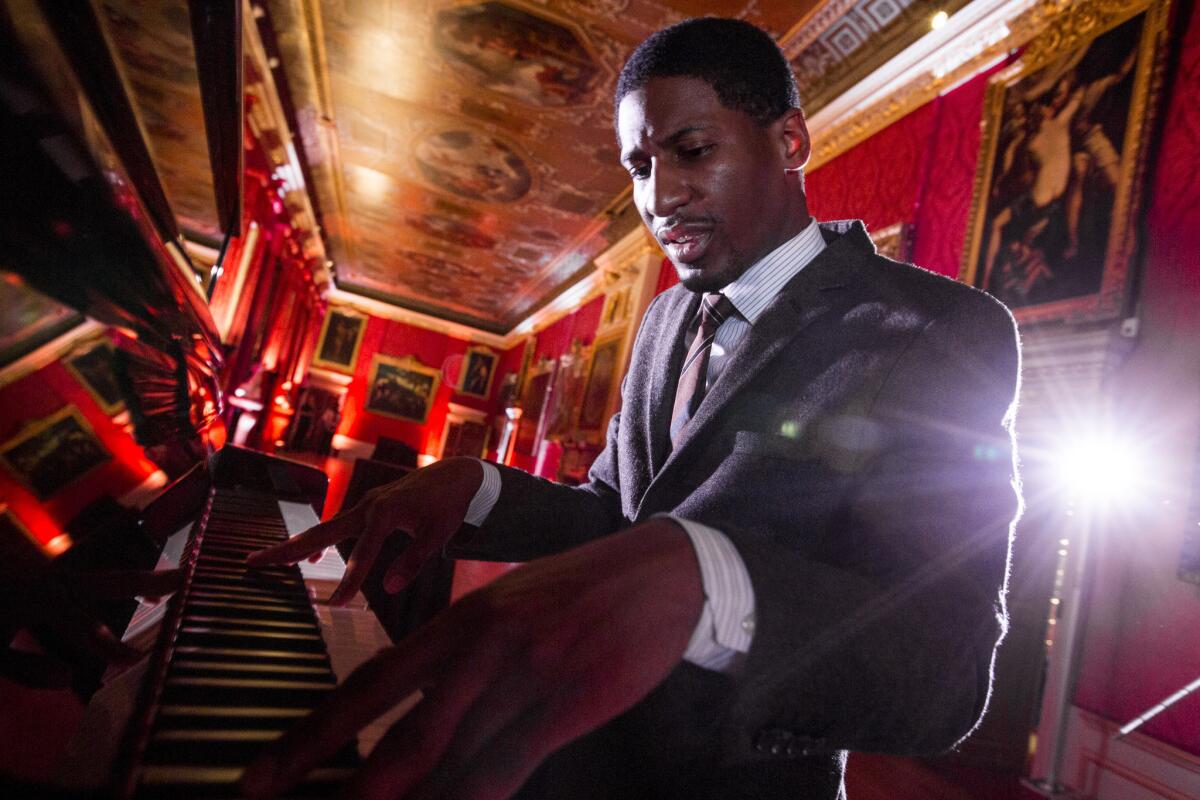Jon Batiste gives jazz a loose interpretation

- Share via
Though his music is steeped in the sound of New Orleans, keyboardist Jon Batiste may be better described as a community organizer than a jazz musician. In fact, he’d probably prefer it that way.
Hailing from a long line of Crescent City musicians, the 27-year-old Batiste released his first album at just 17, a recording that featured jazz favorites Jason Marsalis, Donald Harrison Jr. and Christian Scott. Though that hints toward Batiste’s understanding of a specific style of music, his latest album with his band Stay Human is more difficult to pin down.
Released last fall, the record makes room for candlelight solo piano ventures (“D-Flat Movement”), gospel-infused rave-ups (“Let God Lead”) and freely draws from the anthemic funk of Stevie Wonder and early jazz innovator Jelly Roll Morton.
“The intent of the music is to make people feel a range of emotions,” Batiste said, speaking by phone from Manhattan. He was between stops on a tour that takes him to the Hollywood Bowl for the Playboy Jazz Festival this Sunday. “But the thing about what we do is it’s rooted in jazz, but it’s not jazz. It’s something else.”
The term Batiste prefers is “Social Music,” which happens to be the title of his latest record. And though it’s a fittingly broad umbrella for an album that brushes against so many genres, it’s also something of a mission statement for an artist striving for person-to-person connections.
“I think that is really what inspires me most about being able to play live, especially going to different places where there may be some sort of barrier or perceived barrier,” Batiste said, referencing recent trips to Doha, Qatar as well as appearances at juvenile detention centers during tour stops. “The music serves as something to break those barriers and bring people together from different backgrounds.”
In one recent YouTube video, Batiste led an impromptu parade from a recent performance at New York City’s Webster Hall. Playing a hand-held cross between a keyboard and a harmonica called a melodica (though he prefers “harmoniboard”), Batiste and his band led fans into a subway station, onto a train and back with all the exuberance of a New Orleans street parade.
“We call those ‘love riots,’” Batiste said, adding that many such shows were gathered with the help of social media. “The idea is really just to use music as something that can bring people together and show the power of music to foster community.” The experiences eventually resulted in “My N.Y.,” a self-produced album recorded on New York City subway trains.
Although such intimacy comes easily to a performer just starting out, Batiste’s rising profile makes such experiences harder. In addition to playing at jazz festivals like Playboy and Newport, Batiste was recently awe-struck while performing for tens of thousands of people at the genre-blending BottleRock festival in Napa, Calif.
“As human beings we’re not set up to receive each other’s energy in an intimate way when you’re in that environment.... There’s nothing that can beat standing two feet away from the guy as he’s singing to you and looking him in the eye,” Batiste said.
“It’s not that one experience is better or worse, I just feel like it’s not as represented in the popular mainstream — that spontaneity and that moment of, ‘Wow, I didn’t know that music could be this.’”
Although Batiste has a near-evangelical approach to bringing his music to the people, he takes care not to be considered part of a new generation of jazz artists. Though his album at times toys with such expectations, such as in the buoyant “Express Yourself” when he playfully asks “What is jazz?” — only to have the voice of Jelly Roll Morton answer — Batiste resists taking that label for himself.
“I never thought of music as one thing, and I never thought of myself as one type of musician,” Batiste said. “To have made my name in the jazz community thus far is something I’m definitely glad [to do]. But since the beginning I’ve been kind of all over the place. It would be foolish to kind of just say that now I’m a jazz musician because public perception led people to believe that.”
Still, Batiste’s love for jazz tradition is beyond question.
One of his album’s highlights is a stormy reading of “St. James Infirmary,” a classic popularized by Louis Armstrong, and he serves as the artistic director at the National Jazz Museum in Harlem, another effort he chalks up to community-building. Batiste grew up with the funk sound of the Neville Brothers and the Meters, but without jazz, social music might not exist.
“Jazz can accommodate so many things,” Batiste said. “Jazz is like the universe, it’s been expanding since its creation and it’s connected to everything.”
----------------------------
Playboy Jazz Festival
Saturday lineup: Dianne Reeves, Jamie Cullum, Celebrating George Duke with Al Jarreau and Stanley Clarke, Kenny Barron Trio with Ravi Coltrane, Arturo Sandoval Big Band, Allen Stone, Butler-Burnstein & the Hot 9, Tia Fuller, the New Jump Blues, the LAUSD/Beyond the Bell All-City Jazz Band
Sunday lineup: George Benson, Dave Holland’s Prism, Fantasia, Dr. Lonnie Smith, Jose James, Juan de Marcos & the Afro-Cuban All-Stars, Jon Batiste & Stay Human, James Cotton Blues Band, Los Amigos Invisibles, Esperanza High School Jazz Band
Where: Hollywood Bowl, 2301 N. Highland Ave., L.A.
When: Sat.-Sun., 3 p.m.
Cost: $179.50-$39
Info: https://www.hollywoodbowl.com
More to Read
The biggest entertainment stories
Get our big stories about Hollywood, film, television, music, arts, culture and more right in your inbox as soon as they publish.
You may occasionally receive promotional content from the Los Angeles Times.











